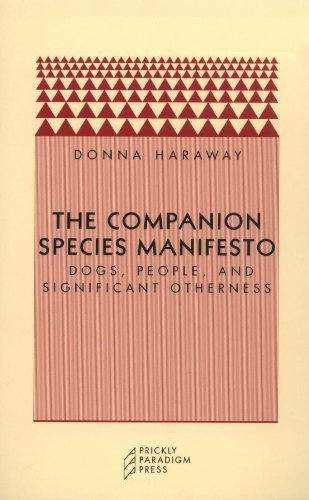Karen Barad: Meeting the Universe Halfway: Quantum Physics and the Entanglement of Matter and Meaning (2007)
Filed under book | Tags: · agency, agential realism, apparatus, epistemology, ethics, materialism, ontology, philosophy, physics, posthumanism, quantum mechanics, quantum physics, science

“Meeting the Universe Halfway is an ambitious book with far-reaching implications for numerous fields in the natural sciences, social sciences, and humanities. In this volume, Karen Barad, theoretical physicist and feminist theorist, elaborates her theory of agential realism. Offering an account of the world as a whole rather than as composed of separate natural and social realms, agential realism is at once a new epistemology, ontology, and ethics. The starting point for Barad’s analysis is the philosophical framework of quantum physicist Niels Bohr. Barad extends and partially revises Bohr’s philosophical views in light of current scholarship in physics, science studies, and the philosophy of science as well as feminist, poststructuralist, and other critical social theories. In the process, she significantly reworks understandings of space, time, matter, causality, agency, subjectivity, and objectivity.
In an agential realist account, the world is made of entanglements of “social” and “natural” agencies, where the distinction between the two emerges out of specific intra-actions. Intra-activity is an inexhaustible dynamism that configures and reconfigures relations of space-time-matter. In explaining intra-activity, Barad reveals questions about how nature and culture interact and change over time to be fundamentally misguided. And she reframes understanding of the nature of scientific and political practices and their “interrelationship.” Thus she pays particular attention to the responsible practice of science, and she emphasizes changes in the understanding of political practices, critically reworking Judith Butler’s influential theory of performativity. Finally, Barad uses agential realism to produce a new interpretation of quantum physics, demonstrating that agential realism is more than a means of reflecting on science; it can be used to actually do science.”
Publisher Duke University Press, 2007
ISBN 082238812X, 9780822388128
xiii+524 pages
Reviews: S.S. Schweber (Isis, 2008), Sherryl Vint (Science Fiction Studies, 2008), Peta Hinton (Australian Feminist Studies, 2008), Lisa M. Dolling (Hypatia, 2009), Vita Peacock (Opticon1826, 2010), Beatriz Revelles Benavente (Graduate Journal of Social Science, 2010), Trevor Pinch (Social Studies of Science, 2011), Haris Durrani (2015).
Commentaries: Levi R. Bryant, Steven Craig Hickman.
PDF, PDF (updated on 2018-11-4)
Comments (3)Cary Wolfe: Animal Rites: American Culture, the Discourse of Species, and Posthumanist Theory (2003)
Filed under book | Tags: · animal, colonialism, philosophy, posthumanism, race, sexuality

In Animal Rites, Cary Wolfe examines contemporary notions of humanism and ethics by reconstructing a little known but crucial underground tradition of theorizing the animal from Wittgenstein, Cavell, and Lyotard to Lévinas, Derrida, Žižek, Maturana, and Varela. Through detailed readings of how discourses of race, sexuality, colonialism, and animality interact in twentieth-century American culture, Wolfe explores what it means, in theory and critical practice, to take seriously “the question of the animal.”
With a Foreword by W.J.T. Mitchell
Publisher University of Chicago Press, 2003
ISBN 0226905144, 9780226905143
237 pages
Donna J. Haraway: The Companion Species Manifesto: Dogs, People, and Significant Otherness (2003)
Filed under book | Tags: · animal, companion species, dogs, posthumanism

“The Companion Species Manifesto is about the implosion of nature and culture in the joint lives of dogs and people, who are bonded in “significant otherness.” In all their historical complexity, Donna Haraway tells us, dogs matter. They are not just surrogates for theory, she says; they are not here just to think with. Neither are they just an alibi for other themes; dogs are fleshly material-semiotic presences in the body of technoscience. They are here to live with. Partners in the crime of human evolution, they are in the garden from the get-go, wily as Coyote. This pamphlet is Haraway’s answer to her ownCyborg Manifesto, where the slogan for living on the edge of global war has to be not just “cyborgs for earthly survival” but also, in a more doggish idiom, ‘shut up and train.'”
Publisher Prickly Paradigm Press, 2003
ISBN 0971757585, 9780971757585
112 pages
Author’s lecture (video, Sep 2003), (2)
Reviews: Heidi J. Nast (Cultural Geographies, 2005), Rebecca Cassidy (Theory, Culture & Society, 2006), Cristina Pauli Monguilod (Athenea Digital, 2006), Katie Williamsa (Women’s Studies in Communication, 2007).
PDF (updated on 2022-12-22)
Comment (0)
